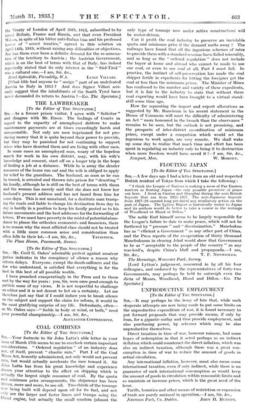COAL COMBINES
[To the Editor of THE SPECTATOR.]
SIR,—Your footnote to Sir John Latta's able letter in your issue of March 17th seems to me to overlook certain important considerations. " Ordered regulation " of an industry does not, of itself, prevent " chaotic ruin." Part I of the Coal Mines Act, honestly administered, not only would not prevent ruin, but would actually accelerate the race toward it. Sir John Latta has from his great knowledge and experience drawn your attention to the effect on shipping which is actually the largest single consumer of coal. By the quota and minimum price arrangements, the shipowner has been driven, more and more, to use oil. Two-thirds of the tonnage now being built will depend upon oil for its fuel, and not only are the larger and faster liners and tramps using the Diesel engine, but actually the small coasters (almost the
only type of tonnage now under active construction) will be motor-driven.
. Can it profit the coal industry to preserve an inviolable quota and minimum price if the demand melts away 1' The railways have found that all the ingenious schemes of rates to provide them with a standard revenue have failed miserably, and so long as the " ordered regulation " does not include the buyer at home and abroad who cannot be made to use our coal, or even to use coal at all, Part I must fail. In practice, the instinct of self-preservation has made the coal shipper fertile in expedients for letting the foreigner get the coal at less than the minimum prices. The Minister of Mines has confessed to the number and variety of these expedients, but it is fair to the industry to state that without them "coal exporting would have been brought to a virtual stand- still some time ago.
How far separating the import and export allocations as suggested by Mr. Runciman in his recent statement in the House of Commons will meet the difficulty of administering an Act " more honoured in the breach than the observance " remains to be seen, but the outlook is not promising, and the prospects of inter-district co-ordination of minimum prices, except under a compulsion which would set the ingenious to work again, are very remote. We shall wake Up some day to realize that much time and effort has been spent in regulating an industry only to bring it to destruction when more freedom would have saved it 1—I am, Sir, &c.,








































 Previous page
Previous page